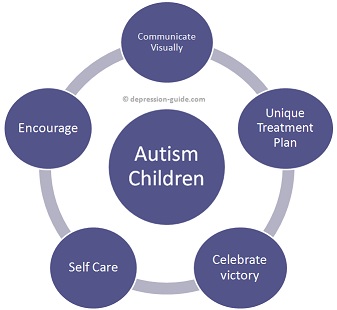Ways for Living with Autism
TweetAlthough each struggler of Autism is different and might carry different ways of handling at ground level, there are some common things which we can take care of for better living of ASD people. The tips below will help you in defining the strategies you can takup while dealing with ASD children as a parent, teacher, caregiver or friend.
Remember that you alone cannot help your child or student or friend from accepting and living with autism. It is important to ensure that you as a caregiver or parent or friend has adequate support you need. You need to take care of yourself and believe me, it is not selfishness but a very big necessity. You have to be patient, emotionally strong and positive.
Small tips
- Always check for the simple signs of anxiety and discomfort in your child and change the communication mechanism - like lower the specific things you use (expression, finger or body gestures, eye movements, etc.) if you see signs of anxiety. Autistic child cannot comprehend the information if he is anxious. You can take some alternate means like using symbols, charts, timetables, stories for helping them understand.
- Use short sentences with the kids. Do not use fillers and other non-important information. Make it crisp and to the point.
- Say no to all the question based communications. Do not use terms like Who, What, When, Where, Why, How, etc.
- There is a gap in your telling an instruction and the child's ability to understand the information and respond. Be patient and wait for his response back.
- Encourage them to use the visual communication mechanisms like showing placards, visual boards, fingers, etc, if they want to say something or other.

Living with Autism is Difficult
Learn whatever you can about autism if you are supporting a autistic child. Read about it, talk to experts, take help from Autism institutions, form a peer group of autistic child parents, share your feeling with your other family members, etc. These are some of the simple steps which can prepare yourself to handle the situations for your child.
You should provide structure and safety to your child. Change your own routine, change the way you talk and include more visual communication techniques. if he or she never speaks. You just need to learn the language. Create a treatment plan for your child which is very specific to his needs. Remember that every autism spectrum child is unique and they have different needs and requirements.
While selecting school or colleges, visit the campus facilities and setup an appintment with the center which deals with kids with disabilities. Know what is available before you decide you need it for your child or not. Meet with people and take down their numbers and timing incase you need it during the semesters.
Remember to take timeout for yourself and do not ignore yourself. You are not selfish in doing this and should be rejuvinating yourself by taking turns with your partner and some othe help. Do not go in guilt and think it is you who is not able to handle things. The things are tough and complex. They are not easy with ASD children. You might get feelings like anger, guilt, depression, confusion, relief, etc, which can impact your emotional health. You need people to talk to and reduce the anxiety you carry. You will be highly surprised to see the impact on yourself, if you share the challenges, emotions, etc.


Sometimes crying or laughing
are the only options left,
and laughing feels better right now.

Current Issue
 Self Help Leaflets Take the help of our self help leaflets or booklets. |
 The DG Magazine All about living with depression |
Know more on Autism
- Autism Spectrum Disorders
- Autism Symptoms and Early Signs
- Autism Rating Scale
- Helping Children with Autism
- Repetitive Behavior
- Autism
- Autism in Early Years
- Autism Friendly Environment
- Bullying and Autism
- Living with Autism
- PDD - NOS
- Myths Facts and Statistics of Autism
- A guide for adults
- Can Autism be prevented?
- Speech problem with autism
- Autism and Ageing
- Medication for autism
- Treatment
- History
- Diagnosis
- Conditions associated with autism
- Sibling
- Autism and Stress
- Facts and Statistics
- How to Choose the Right School for Your Child With ASD












